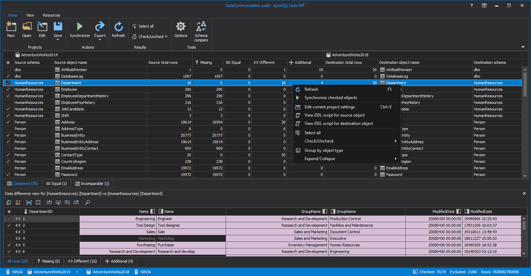In our blog, “An introduction to 8 ApexSQL tools,” we introduced our Toad World® readers a new member in the Quest® family of database tools, ApexSQL. While ApexSQL has 29 (and growing) DBA and developer tools, we narrowed our focus to 8 tools that we thought would be of interest. This year, we’ll expand on that introduction and provide a helpful accompanying blog series for each.
ApexSQL tools are built for the Microsoft SQL Server with you in mind
As DBA and developer roles continue to expand, and database environments continue to evolve, we understand you need reliable tools. ApexSQL tools are built for the Microsoft SQL Server environment. With its proven SQL expertise and solutions, ApexSQL provides competitive SQL solutions for database auditing, recovery, change management, development and documentation.
How can ApexSQL Data Diff help me?
Data comparison and synchronization between databases is often tasked these days and a proper tool is needed to handle that job without issues and/or errors. ApexSQL Data Diff is that kind of a tool. It can compare and synchronize SQL Server data between databases and database backups, and it can also compare data under script folders and source control projects.
So what's the main difference between Diff and Data Diff? The main difference between ApexSQL Diff and ApexSQL Data Diff is that ApexSQL Diff compares and synchronizes schemas (structure), while ApexSQL Data Diff compares and synchronizes data.
It also supports comparison and synchronization of SQL Azure Databases, Amazon RDS for SQL Server, CLI, creating automation scripts (batch and PowerShell scripts), and executable installation packages.
It can automate and schedule database data migrations, propagate data changes from one environment to another, identify and repair lost and/or damaged data, perform row level recovery from SQL backups without restoring.
In case something goes wrong, ApexSQL Data Diff can reverse any changes made by automatically creating a backup prior to database synchronization, or a rollback script.
With this tool you'll be able to create sophisticated reports to document the differences between your data sources and schedule your migration unattended, using the Command Line Interface and automation scripts.
Why are these blogs important?
The provided articles will help you better understand the tool itself and how to quickly compare data between different SQL Servers and data source, filtering data, along with automation:
- How to narrow a data comparison to affected rows only
- How to automatically synchronize the data in two SQL Server databases on a schedule
- How to automatically compare and synchronize multiple databases on different SQL Server instances
- How to migrate a SQL Server database to a newer version of SQL Server
- Recover deleted SQL data from a backup or from online database files
- How to restore a SQL Server database backup to an older version of SQL Server
- Restore only specific data from SQL backups
- How to automatically compare and synchronize a shared SQL script folder with SQL Server database data
- How to apply static data under source control to a SQL Server database
- How to commit and/or update SQL Server database static data to a source control repository
Automate and run unattendedWith ApexSQL Data Diff, there is no need for manual comparison and synchronization of data, as the complete process can be automated and run unattended, while you can sit back and just check the created output files once it’s done. Learn more about ApexSQL Data Diff. |
Share on social media
If you think your colleagues would benefit from this blog, share it now on social media with the buttons located at the top of this blog post. Thanks!

Start the discussion at forums.toadworld.com